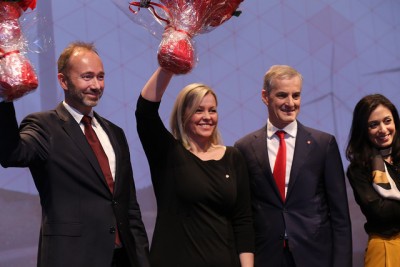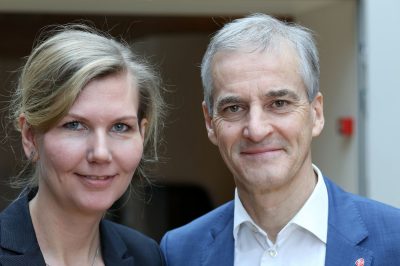NEWS ANALYSIS: Norway’s conflict-ridden Labour Party (Arbeiderpartiet) wound up a week of historic drama on Sunday, after the international “Metoo” campaign against sexual harassment finally hit the party’s large and powerful chapter in Trøndelag. It all ended with a chaotic annual meeting that also ended controversial politician Trond Giske’s long Labour Party career.

Giske, a Member of Parliament and former government minister, has long been accused of harassing young women and being at the center of a hard partying culture rife with power plays and sexual innuendo. In Trøndelag, the party- and partying culture was so rough that many older female politicians reportedly warned young women against some of the older male politicians, not least when it was traditional for them all to head for a bar after party meetings.
The problem is that few dared to talk openly about it, much less blow the whistle and file complaints. With the exception of some Labour Party women who did not come from Trøndelag, and filed accusations against Giske during the height of the “metoo” campaign in late 2017, most of the Trøndelag women active in the Labour Party kept quiet for fear of damaging their own careers.
Until last week, when the Trøndelag chapter nominated Giske to take over as its leader. An allegedly “unanimous” nominations committee claimed he had changed his ways and should be given another chance after being forced to resign as a national deputy leader of Labour in early 2018.
Nomination ignited fury
The nomination proved to be explosive, finally igniting the underlying fury of several current and former young female Labour Party politicians in Trøndelag. It especially erupted after the former head of the party’s local AUF youth chapter wrote a commentary claiming that she should have spoken up “when I was 17. And 20. And 23. But I’m speaking up now.” Ellen Reitan, once a promising politician for Labour who has since opted to live and study in Phoenix, Arizona, described a culture of sexual harassment carried out by male party members in Trøndelag, not least Giske, with rough language and flirting that was so extreme that it was viewed as threatening.
“Trond Giske was all-powerful in Trøndelag, he’s had the network both within the party, (trade union federation) LO, other political organizations and cultural life,” Reitan told newspaper Dagens Næringsliv (DN) after her commentary on social media last week set off a wave of other young women finally coming forward as she had. There had already been lots other negative reaction to Giske’s nomination, but now it was coming from within Trøndelag, and directly challenging the party chapter’s powers-that-be.

One by one, the accusations started pouring in, against Giske and other men in the party, and they were disturbing indeed. Among those filing new complaints were Sandra Skillingsås, part of the chapter’s inner circle and viewed as a Giske supporter but who now claims she actually feared him. “If you spoke out, or went against Trond, you’d be squeezed out,” Skillingsås told local newspaper Adresseavisen late last week. Harsh criticism of Giske’s nomination also came from around the country, both inside and outside Labour, but Labour’s top officials in Oslo insisted that the party’s local chapters must be allowed to make their own leadership decisions.
It didn’t take long, however, for other Labour women and many men to claim that Giske’s nomination was “an issue that affects us all.” It would also have made him eligible for a new ministerial post if Labour wins next year’s national election.
Party leader Jonas Gahr Støre, moreover, had not ruled out that possibility, much to the outrage of others within the party. Støre has long been criticized for not being tougher on Giske back in 2017-2018. In an interview with Norwegian Broadcasting (NRK) in late July, he claimed the party had indeed taken “metoo” complaints seriously, that “we had to make conclusions … and we have done that in a way that also notes there are ways back.”
Støre accused of being weak and offensive
When Støre refused to rule out Giske as a ministerial candidate, he also went on to offend several top female Labour politicians like Marianne Marthinsen and Jette Christesen who have identified “the Giske case” as a reason they’ve left or are leaving politics. “No one is indispensable,” Støre told NRK. “New, exciting people come after them. I think those who leave (politics) can leave, and they should also be grateful for being able to have the responsibility it is to be elected.” He conceded that it “was painful” for the party to experience “metoo” at the end of 2017 and into 2018, “but we handled it, we made decision and we moved on, and that should be respected.”
After being made aware of reaction to his response, Støre’s communications adviser sent out a “clarification” later that evening claiming that Støre “wanted to stress that he was very grateful for what both Marianne Marthinsen’s and Jette Christensen’s contributions to the Labour Party over many years.”

Marthinsen, whom Støre had replaced with Giske as finance policy spokesperson after a disastrous election in 2017, has not made a secret of her dislike for Giske’s power plays over the years. She also supported the whistle-blowers who dared to first speak out three years ago and thought Giske’s “rehabilitation” came too soon. She has been quoted as saying that she would have preferred seeing Giske put the party and its need for unity ahead of himself. There’s no question Giske has long been a divisive factor within the party, adhering to the left side of its political floy and being a part of its “old boys’ network” even though he was far from the oldest among them.
Few question that Giske’s ultimate decision to now withdraw from his nomination as party chapter leader (after initially saying he was “humbled and touched” to be nominated) and as an MP candidate next year is good news for Støre. As party leader representing the more moderate side of Labour politics, Støre is often caught in the middle of party conflicts. Several political commentators claimed Støre probably was heaving a huge sigh of relief when Giske had to bow out. Even the hard-boiled Giske had to admit that “I can’t be part of this any longer, nor for a renomination to Parliament. The burden is too great.”
‘Long, intense and emotional’ weekend meeting
Now attention is turning to how or whether Labour can rebound from all the trouble of the past three years, and not least the past week. Even the election of a replacement for Giske led to more conflict within the chapter: Rennebu Mayor Marit Bjerkås was clearly not the next-best-choice by the rank and file within the chapter, and members forced through the nomination of yet another choice, MP Ingvild Kjerkol, who won by a vote of 156 to 75. That clearly frustrated committee leader and MP Arild Grande, who claimed he has “personal reasons” for not backing his fellow MP colleague Kjerkol. Grande had also been a firm Giske supporter.
Newspaper Aftenposten described the Labour Party chapter’s annual meeting over the weekend (which had to be held in two locations, Trondheim and Steinkjær, and digitally because of Corona virus containment measures) as “long, intense and emotional.” Members of the party’s youth organization AUF had even turned their backs on Giske and walked out during his farewell speech. Then came the nomination committee’s second humiliation, when even its second choice failed to win support, and still swirling are all the “metoo” allegations, years of a rough party culture and an ongoing feeling that top party leders in Oslo have not handled it well at all.

Kjerkol claimed in her acceptance speech as new chapter leader, that “a political party that can’t offer a safe milieu for young members has no place in politics. Now we must grow up and act like adults.” Many others were claiming that what’s most important now, is for Labour to unite and be able to debate and agree on politics, not their own politicians.
Kjersti Stenseng, who holds the powerful top administrative job in Labour as party secretary, has also apparently realized that her past support for Giske was not appreciated. Now she’s criticizing Arild Grande for leading a nomination process that ended in national embarrassment. She also indicated that not all complaints of sexual harassment have been forwarded to party headquarters, not least one that Grande himself alleged against Kjerkol.
“Now I hope we can all put the discussions and conflicts we’ve had behind us,” Stenseng told NRK Sunday evening. Others note that party leader Støre also must take responsibility for letting the situation become so chaotic, also for not setting any limits as to when Giske could seek top positions again. It’s now clear, wrote author Anja Sletteland in newspaper Klassekampen, that Giske himself “could not accept opposition,” fought back against whose filing complaints against him and put himself ahead of the party. Støre implicitly allowed that to happen and now both Støre and Stenseng have to win back the confidence they lost, even though in many cases it’s too late.
“The job of cleaning up after all of this is huge,” wrote political commentator Kjetil B Alstadheim in newspaper Aftenposten. “That’s the legacy Giske has left.”
NewsInEnglish.no/Nina Berglund

